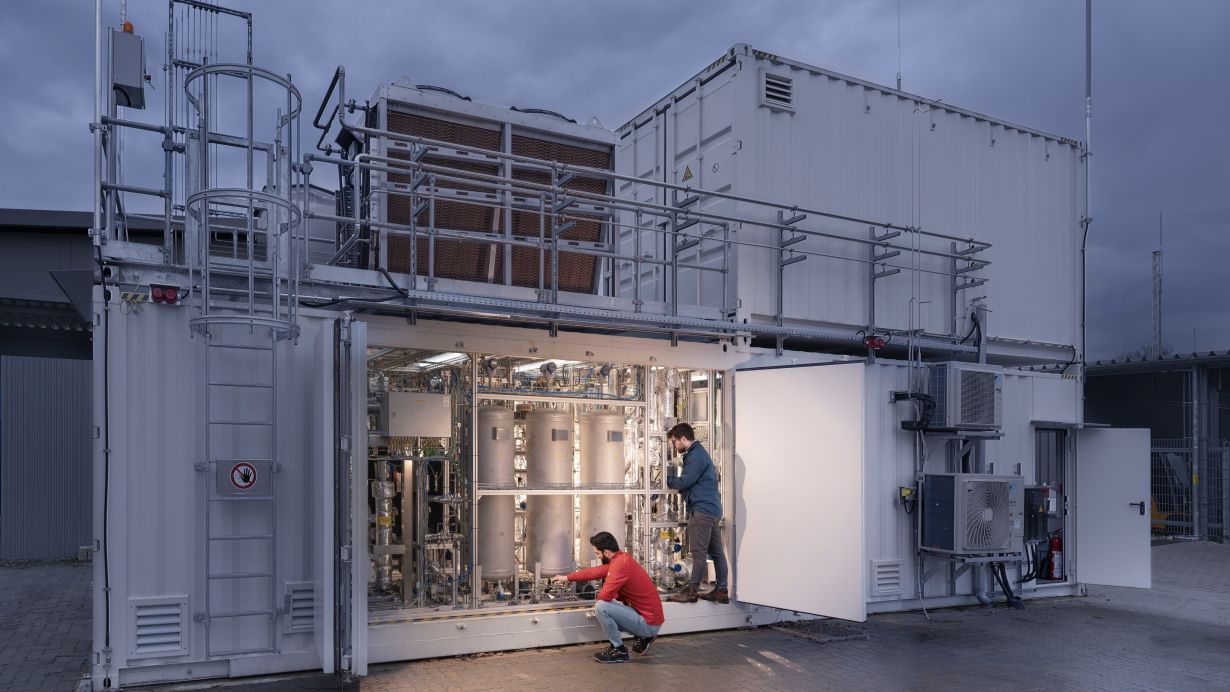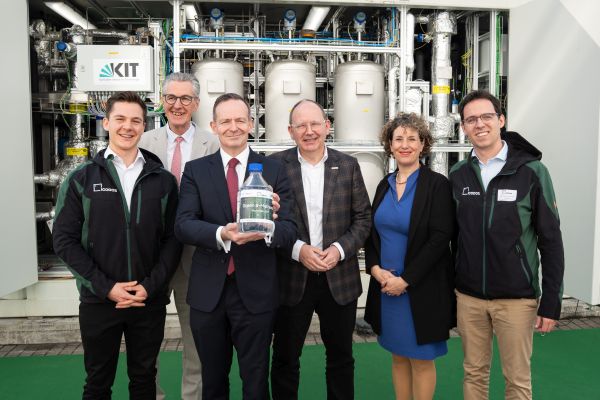
Europe's approximately 80,000 sewage treatment plants offer considerable potential for an innovative, carbon-neutral process for the production of the universal chemical methanol.. ICODOS, a start-up founded at the Karlsruhe Institute of Technology (KIT), and its partners have built an innovative facility at Mannheim's sewage treatment plant. The facility purifies the biogas produced by the plant and uses green hydrogen to convert it into carbon-neutral fuel for ships. They opened the facility today, March 24, 2025.
According to estimates by the International Maritime Organization, shipping accounts for approximately 3 percent of global greenhouse gas emissions. To reduce those emissions, environmentally friendly alternatives to conventional fossil fuels are urgently needed. Today (March 24, 2025) a consortium consisting of the Institute for Micro Process Engineering and the Institute for Automation and Applied Informatics at KIT, the KIT spin-off ICODOS, and the Waste Water Department of the City of Mannheim began operation of a demonstration plant that uses wastewater as a resource for the production of carbon-neutral methanol, a future marine fuel. Dr. Volker Wissing, Germany's Federal Minister for Digital and Transport, pressed the start button.
"We need to keep all of our technology options open in order to achieve our climate objectives. In addition to electrification and hydrogen propulsion, we need climate-friendly fuels for marine shipping in particular, and Germany should play a leading role in their research and development. That will be a growth market in the future," Wissing said. "This is also about making our country independent from energy imports. Mannheim 001 shows how economic efficiency and climate action can go hand in hand. This project can serve as an example for many other locations in Germany and Europe."
"This new facility is a striking demonstration of how research and entrepreneurship can lead to practical solutions for the successful transformation of our economy," said Professor Thomas Hirth, KIT's Vice President for Transfer and International Affairs. "The biogas it produces during wastewater treatment is a valuable resource. This is an innovative approach that shows how available resources can be used in a smart and climate-friendly way."
"As a lighthouse project, Mannheim 001 is further proof that climate action and industrial growth can go hand in hand with new technologies," said Mannheim's mayor, Christian Specht, who was also present. "With support from Mannheim's climate fund and in close cooperation with our waste water department, it's showing how a start-up from our Mafinex Technology Center can produce green fuel for the shipping industry. That's another innovation made in Mannheim that we can be proud of."

Gemeinsame Eröffnung der Anlage „Mannheim 001" mit (v.l.n.r.) David Strittmatter, Geschäftsführer
und Mitgründer ICODOS; Alexander Mauritz, Eigenbetriebsleiter Stadtentwässerung; Dr. Volker
Wissing, Bundesminister; Christian Specht, Oberbürgermeister der Stadt Mannheim; Prof. Diana
Pretzell, ErsteBürgermeisterin der Stadt Mannheim; Dr. Fracisco Vidal Vázquez, Geschäftsführer
und Mitgründer ICODOS.
Innovative Process Using Biogas
The Mannheim 001 demonstration plant uses a patented process to convert biogas extracted from wastewater into carbon-neutral methanol. In the first stage, the biogas originating in the sewage treatment plant is purified. The CO₂ it contains then reacts with green hydrogen to produce methanol, a versatile raw material that can be used in the chemical industry or as fuel for ships. "With our technology, we can extract a high-quality energy carrier from an existing source," said Dr. Vidal Vazquez, a co-founder of ICODOS. "Sewage plants could produce several million tonnes of renewable methanol per year in Germany alone." With its compact and scalable design, the process is ideal for distributed implementation. "Our current project shows the previously untapped potential of sewage plants as a core element of sustainable fuel production," Vazquez said. ICODOS is already in discussions with other sewage plant operators about building further production systems.
About ICODOS
ICODOS GmbH, a climate-tech start-up based in Mannheim, originated in a KIT research project. It specializes in the sustainable production of fuels and chemicals using renewable sources such as biogas and CO₂ in combination with green electricity. ICODOS's goal is to use process engineering and modular facilities to make an economically viable contribution to climate change mitigation.
More about the KIT Energy Center
Being "The Research University in the Helmholtz Association", KIT creates and imparts knowledge for the society and the environment. It is the objective to make significant contributions to the global challenges in the fields of energy, mobility, and information. For this, about 10,000 employees cooperate in a broad range of disciplines in natural sciences, engineering sciences, economics, and the humanities and social sciences. KIT prepares its 22,800 students for responsible tasks in society, industry, and science by offering research-based study programs. Innovation efforts at KIT build a bridge between important scientific findings and their application for the benefit of society, economic prosperity, and the preservation of our natural basis of life. KIT is one of the German universities of excellence.






